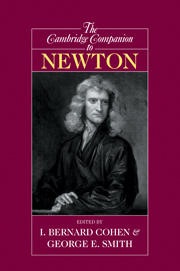Book contents
- Frontmatter
- Introduction
- 1 Newton's philosophical analysis of space and time
- 2 Newton's concepts of force and mass, with notes on the Laws of Motion
- 3 Curvature in Newton's dynamics
- 4 The methodology of the Principia
- 5 Newton's argument for universal gravitation
- 6 Newton and celestial mechanics
- 7 Newton's optics and atomism
- 8 Newton's metaphysics
- 9 Analysis and synthesis in Newton's mathematical work
- 10 Newton, active powers, and the mechanical philosophy
- 11 The background to Newton's chymistry
- 12 Newton's alchemy
- 13 Newton on prophecy and the Apocalypse
- 14 Newton and eighteenth-century Christianity
- 15 Newton versus Leibniz: from geometry to metaphysics
- 16 Newton and the Leibniz-Clarke correspondence
- Bibliography
- Index
Introduction
Published online by Cambridge University Press: 28 May 2006
- Frontmatter
- Introduction
- 1 Newton's philosophical analysis of space and time
- 2 Newton's concepts of force and mass, with notes on the Laws of Motion
- 3 Curvature in Newton's dynamics
- 4 The methodology of the Principia
- 5 Newton's argument for universal gravitation
- 6 Newton and celestial mechanics
- 7 Newton's optics and atomism
- 8 Newton's metaphysics
- 9 Analysis and synthesis in Newton's mathematical work
- 10 Newton, active powers, and the mechanical philosophy
- 11 The background to Newton's chymistry
- 12 Newton's alchemy
- 13 Newton on prophecy and the Apocalypse
- 14 Newton and eighteenth-century Christianity
- 15 Newton versus Leibniz: from geometry to metaphysics
- 16 Newton and the Leibniz-Clarke correspondence
- Bibliography
- Index
Summary
Isaac Newton deserves to be included in a series of companions to major philosophers even though he was not a philosopher in the sense in which Descartes, Locke, and Kant were philosophers. That is, Newton made no direct contributions to epistemology or metaphysics that would warrant his inclusion in the standard list of major philosophers of the seventeenth and eighteenth centuries - Descartes, Spinoza, Locke, Leibniz, Berkeley, Hume, and Kant - or even in a list of other significant philosophers of the era - Bacon, Hobbes, Arnauld, Malebranche, Wolff, and Reid. The contributions to knowledge that made Newton a dominant figure of the last millennium were to science, not to philosophy. By contrast, Galileo, the other legendary scientific figure of the era, not only published the most compelling critique of Aristotelian scholasticism in his Dialogues on the Two Chief World Systems, but in the process turned the issue of the epistemic authority of theology versus the epistemic authority of empirical science into a hallmark of modern times. Although Newton clearly sympathized with Galileo, he wrote virtually nothing critical of the Aristotelian tradition in philosophy, and the immense effort he devoted to theology was aimed not at challenging its epistemic authority, but largely at putting it on a firmer footing. Newton made no direct contributions to philosophy of a similar magnitude. Indeed, from his extant writings alone Newton has more claim to being a major theologian than a major philosopher.
- Type
- Chapter
- Information
- The Cambridge Companion to Newton , pp. 1 - 32Publisher: Cambridge University PressPrint publication year: 2002
- 4
- Cited by

